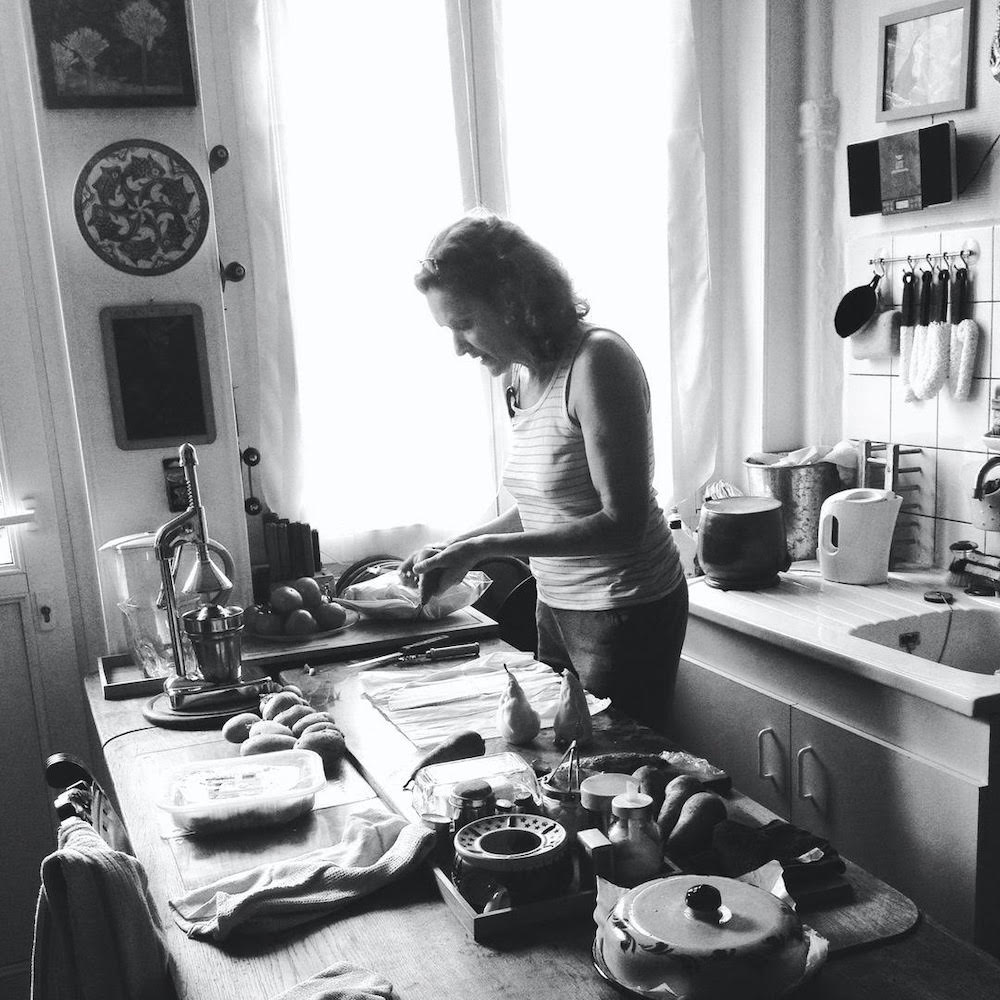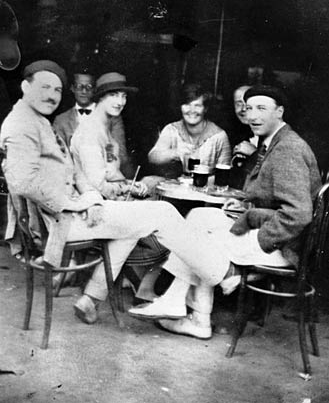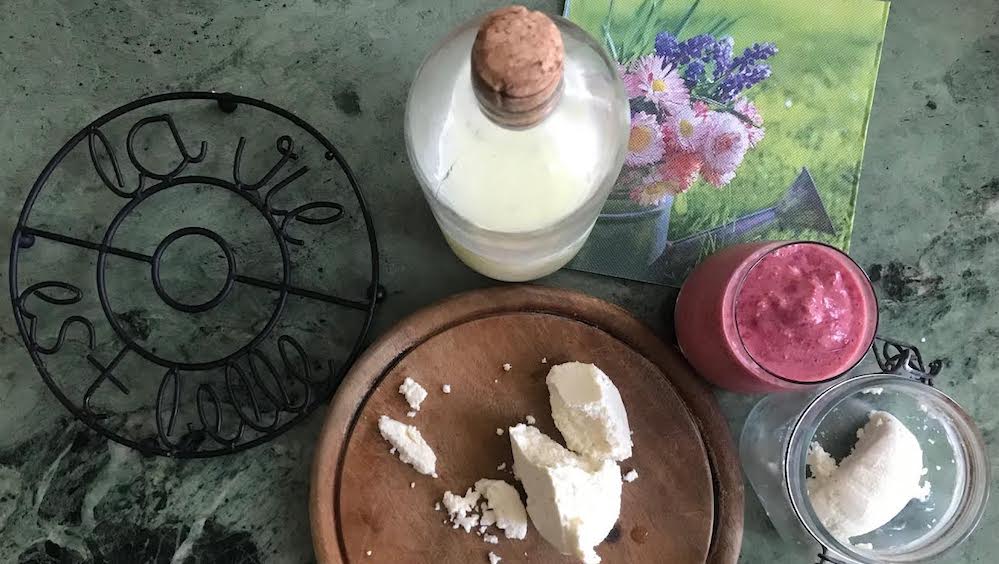Although we are not poor by any stretch of the imaginations, my spouse and I are thrifty, and we appreciate priceless moments that cost little but are immeasurably valuable.
Our Saturday ritual to the open air French market is one of them. The bell tolls – it’s our signal to grab the wicker shopping basket filled with empty glass bottles and head to the market.
I can’t help but think of Ernest Hemingway. His words meander through my mind: “In Paris, there was a way of living well and working, no matter how poor you were, {it} was like having a great treasure given to you.”
The Thionville marché is a lively place, brimming with produce and elbow-to-elbow customers. First stop is the milk maid, since her coveted supply will be the first to go. She’s in her habitual sector dispensing moo-juice by the liter for the bargain price of 80 centimes.
We hand over our empties. With the dexterity of a tailor threading a needle, she turns the spigot and
aims a rubber hose. Icy milk shoots from a stainless steel vat as she deftly fills my order.

Personal hero

Being here reminds me of a simpler time. In “A Movable Feast,” Hemingway describes how he would sit in his frigid apartment anticipating the sound of cow bells. It was his personal alarm to bolt down the stairs to catch the herd ambling down the street. He would stand by as the farmer milked a cow, handing him back the warm vessel.
My dad was a dairyman. I obligingly express my gratefulness to the paysainne who hands over my bottles. I’m reminded of the bumper sticker on my father’s truck: If you have EATEN today, thank a FARMER.
As the producteur laitier and I chat about dairy practices, my husband casts me a worried look. He’s staring at the hand written sign stating, “It’s advised for babies or those with weakened immune systems to cook raw milk before drinking”. My spouse studied physics and chemistry at Louis Pasteur University in Strasbourg, so when I give him an eye roll, his back stiffens.
My husband subscribes to the adage that “old men do not grow wise. They grow careful.”
Louis Pasteur lived in the era of the candle: same time as Vincent Van Gogh and Nikola Tesla. Pasteur died four years before Hemingway was born, and 18 years before the refrigerator was even invented.Now you see the practicality behind why cows were herded down Parisian streets to supply fresh milk to citizens.
Pasteur was my dad’s personal hero since the French microbiologist contributed so much to the field of dairy science. I can still see my dad peering through the viewfinder of our microscope. He’s showing eight-year-old me minuscule blue/green microorganisms bouncing around on a slide. “These are called bacteria. We only want the good ones in our milk,” he would say.
He was not unlike Tesla in his enthusiasm for spic-and-span hand washing. But, his pride and joy were
those sparklingly glass tubes that carried freshly extracted milk in a labyrinthine from the milking parlor to the cooling tanks. He would check the filters every morning to ensure not even a single grain of sand could enter his precious commodity.
Science
Hemingway said, “As a writer, you should not judge, you should understand,” and I concede to my scientific spouses concern. Harmful bacteria could be present in raw milk, potentially endangering the consumer. Diseases like brucellosis, tuberculosis and meningitis (to name a few) were once a major concern.
Nowadays bacteria-based diseases are treatable with penicillin. To be on the safe side, the United States Food and Drug Administration mandates pasteurization but, in France, raw milk is available for purchase by individuals. Rigorous testing is applied at all levels of milk production and the government regularly inspects all dairies, including small French farms selling raw milk.
Still worried? Do what folks did in the “olden days,” SCALD IT.
Naysayers counter that scalding defeats the purpose of buying fresh from the farm, since raw milk provides many gut-healthy probiotics and enzymes. Au contraire. Farm fresh milk has about 4 percent butterfat (depending on which type of cows are involved). Whole cream milk is fabulous for house-made butter, cheese, yogurt and sour cream whether it’s used scalded or raw.
A change of heart
With all that said, my spouse was still not willing to drink my purchase, so I heated it to 185ºF and made ricotta cheese. I reserved the resulting whey for our smoothies. He still gave me a wary look. When I told him to check Google, he discovered that whey is a primary ingredient in protein powders. It facilitates weight loss, helps strengthen muscles and boosts digestion. That’s when he had a change of heart.
With my 80-cent-per-liter 4-percent whole milk, I believe we can live as well as Hemingway, who in “A Movable Feast, said:
“We ate well and cheaply and drank well and cheaply.”
Recipes for house-made:
Ricotta cheese that’s a snap to make with any type of milk (even regular whole milk from the grocery store).
• Yogurt
• Butter
• Sour Cream
Fun Fact: In 1900, almost 40 percent of the total US population lived on farms, when I was a kid it had dropped alarmingly to 3 percent: now it is only one percent.
Currently, France has approximately 60,000 dairy farms producing about 3 billion liters of milk. The United States has about 36,000 farms in the industry that produce about 100 billion liters, respectively.
France is a little smaller than Texas, so comparing the two is a bit unbalanced.
––––––––––
Read more about France here in Dispatches’ archives.
Alice Verberne is a contributing writer for Dispatches Europe. She has worked in print journalism and magazine production in the United States and Europe throughout her career. She currently resides in France where she enjoys visiting former French speaking colonies and discussing history with the locals.















